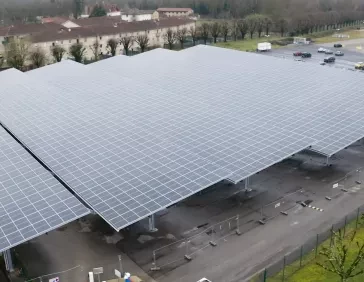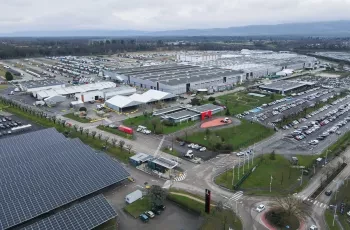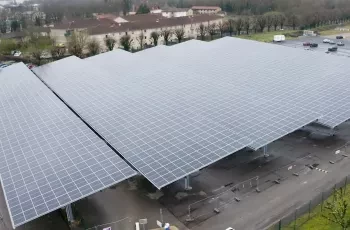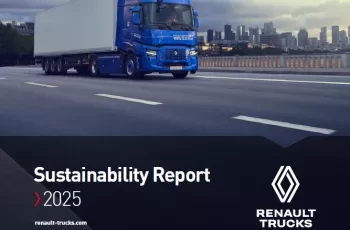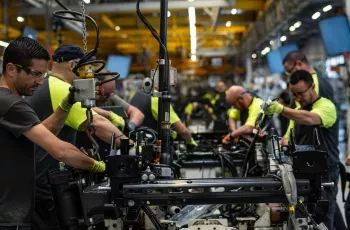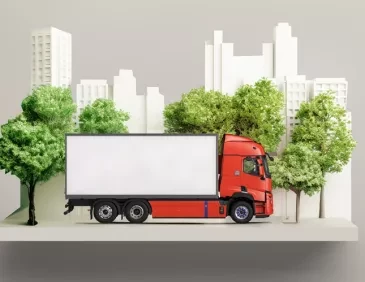Press release - 24 June 2025
Energy efficiency and resource conservation: Renault Trucks’ strategy
In its latest sustainability report, published in June 2025, Renault Trucks details the energy efficiency and resource conservation strategy implemented at its sites. Since 2019, greenhouse gas emissions at these locations have been reduced by 26%. The manufacturer’s goal is to achieve carbon neutrality across all its sites by 2040.
Beyond its commitment to decarbonising road transport, Renault Trucks is also taking action to reduce the environmental impact of its industrial sites through a series of concrete measures.
Reducing greenhouse gas emissions
To reduce the carbon footprint of its factories, Renault Trucks has implemented several measures, such as modernising heating systems, insulating buildings, developing a heat network that recovers waste heat from industrial processes and cutting the number of engine tests. These actions, combined with targeted investments, have resulted in a 26% reduction in greenhouse gas emissions between 2019 and 2024.
- In Lyon, the X-Tech Arena building, which houses 1,300 engineers, consumes 25% less energy than the limit set by French regulations.
- In Blainville-sur-Orne, the renovation of 1,800 m² of buildings saves 265 MWh of natural gas per year.
- In Bourg-en-Bresse, improved building insulation leads to annual energy savings of 100 MWh.
Expanding on-site renewable energy production
Renault Trucks is partnering with third-party investors to develop facilities that generate renewable energy directly on its sites:
- In Bourg-en-Bresse, 17 hectares of car parks are being fitted with photovoltaic canopies, with a total installed capacity of 22 MW peak, which equals the annual electricity consumption of 17,500 people. The facilities will be completed in 2026 and 30% of the electricity generated will be used directly by the site.
- In Lyon, the roof of the future global spare parts distribution centre will be equipped with solar panels, producing enough electricity to meet its own needs and those of neighbouring buildings.
Other solutions complement this approach:
- In Lyon, geothermal systems heat 5,000 m² of office space, saving 360 MWh of energy per year.
- A 2 km heat network is set to be commissioned in 2025 at the same site, 75% powered by thermal energy recovered from industrial processes (the remaining 25% coming from the urban heating network). It will supply heating to 150,000 m² of buildings.
Reducing water consumption
Since 2016, Renault Trucks has cut its water consumption per truck produced by over 60%, reaching 5.9 m³ in 2024:
- On the Lyon site, water use has been reduced fivefold over the past 20 years, thanks in particular to the installation of acoustic sensors that quickly detect leaks.
- In Blainville-sur-Orne, a physico-chemical treatment station purifies water before it is discharged.
- In Lyon, cooling towers have been replaced with closed-loop systems, significantly reducing water requirements.
Eliminating landfill waste
Renault Trucks is aiming to put a complete stop to the landfilling of waste. The sites in Blainville-sur-Orne and Bourg-en-Bresse, along with the engine production unit and spare parts warehouse in Lyon, are already certified “Landfill Free” .
Across all the manufacturer’s sites, waste is sorted, reused or repurposed:
- Metal scraps from production are melted down to create new parts.
- Packaging and logistics supports are reused through internal return loops.
- Waste recovery projects are being developed to optimise every waste stream.
Integrating biodiversity and protecting species
Renault Trucks has banned the use of plant protection products on its sites, favouring practices such as eco-friendly mowing and eco-grazing to maintain green spaces. Beehives have been installed in Vénissieux and Saint-Priest. In Bourg-en-Bresse, Renault Trucks is involved in a preservation programme for the Dévorah stream, which is home to a protected dragonfly species. A partnership with the Reyssouze Catchment Area has been signed up to 2028.
Since 2023, more than 2,400 trees have been planted in Lyon to reduce heat islands and increase soil permeability. A 3,000 m² experimental zone has also been created to restore soil fertility through pedological engineering. This space is designed primarily to create a cool microclimate and support biodiversity by attracting birds, insects and small mammals.
Adapting infrastructure to climate change
Renault Trucks is planning ahead for the impacts of climate change on its sites and conducting climate risk assessments for 2050 and 2100, using the OCARA method developed by Carbone 4. These evaluations identify vulnerabilities to events such as heatwaves, flooding, rising groundwater levels, droughts and strong winds, helping to strengthen the resilience of facilities.
At Blainville-sur-Orne, a roadmap has already been drawn up in collaboration with local authorities to address risks related to sea-level rise and heavy rainfall. In Lyon and Bourg-en-Bresse, efforts are focusing primarily on preventing the effects of extreme heat. Integrating climate challenges has become a key criterion in the design of new buildings and industrial processes.
These actions demonstrate Renault Trucks’ commitment to reducing the environmental footprint of its industrial sites and form part of a broader strategy to decarbonise transport and build a sustainable model. The full range of Renault Trucks’ sustainability initiatives can be found in the report published by the manufacturer. Read the full report here.
Press contact
Phone : +33 4 81 93 09 52
E-mail : severyne.molard@renault-trucks.com

